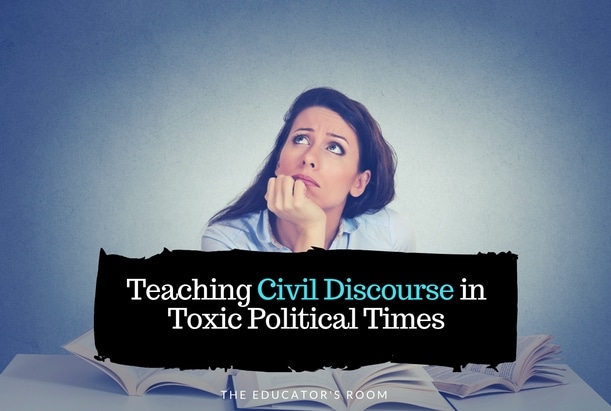It is impossible to ignore the downward spiral of discourse and debate in American politics over the last year. Teachers pay special attention to public discourse because they know that what happens at the higher elevations of society always trickles down to their students. How adults in leadership speak to and about each other will be reflected in the schools. Whether students are influenced by the adults in their homes or on tv, it’s important to realize that teachers will be left to deal with the toxic aftermath of what has become normalized in society. Here are some examples of what civic discourse has become, and following that, five tips on how to detoxify discourse in your classroom.
We just completed two weeks of political party conventions, where our country’s leadership and potential leadership was on display. Most younger students won’t have watched the conventions, but their parents may have, and many older students might have watched. Hopefully teachers watched because every election matters when you are responsible for educating the young people of this country. The conventions give us a good view into the kind of language being used by adult leaders.
[fusion_builder_container hundred_percent=”yes” overflow=”visible”][fusion_builder_row][fusion_builder_column type=”1_1″ background_position=”left top” background_color=”” border_size=”” border_color=”” border_style=”solid” spacing=”yes” background_image=”” background_repeat=”no-repeat” padding=”” margin_top=”0px” margin_bottom=”0px” class=”” id=”” animation_type=”” animation_speed=”0.3″ animation_direction=”left” hide_on_mobile=”no” center_content=”no” min_height=”none”][bctt tweet=”Five tips on how to detoxify discourse in your classroom” username=”EducatorsRoom”]
Throughout the Republican Convention in Cleveland, OH, we heard various examples of criminal claims against the opposing candidate, and harsh language. New Jersey Governor, Chris Christie, turned his entire speech into a list of trial-like accusations against Democratic Candidate Hillary Clinton, after which he called on the crowd to judge her “guilty” or “not guilty.” The crowd’s response, led on by previous speakers and leaders was “lock her up!” Instead of disagreeing on policy decisions and offering alternative options, Gov. Christie chose to use “criminal” language, much of which was later denounced by leaders of his own party. The Republican Candidate, Donald Trump, has himself become famous for the toxic and inflammatory language he uses. He has called women “pigs,” he has labeled Mexican immigrants “murderers and rapists,” and he was a leader in the campaign that claimed President Obama was not a US citizen, and thus illegally in office (the “birther movement”). Much of this year’s election has become wondering what he will say next. This is no way to demonstrate how to discuss differing opinions. Our students need a better example than this in leadership for how to carry on dialogue with each other that neither tears the other person down or sees the other person as “enemy.”
There is tremendous value in teaching our students to dialogue rather than debate. One does not need to “win” a conversation, but rather “understand” in order to engage with ideas. Here are 5 ways to create a foundation for strong civic dialogue in your classroom:
1 – Don’t set students against each other. Create an environment where every student’s opinion matters, but where each student has a voice, even when they disagree. Teaching students to use “I” statements is a great way to establish this habit when you engage in classroom conversation.
2 – Immediately intervene to stop derogatory terms or name calling. You are the boss of your classroom and you must advocate for tolerance and acceptance. That means not accepting name calling or terms that hurt or harm. Those aren’t opinion; those are verbal weapons.
3 – Ask students to always back their arguments with evidence. Teaching about reliable evidence is a valuable skill students can use across subject areas and in real life. It also can de-escalate a toxic conversation when you ask the students to produce reliable evidence for their arguments, rather than “I heard” or “my mom says..”
4 – Give students an opportunity to explore controversial topics. It doesn’t help to shelter students from the controversies that live in our society. Rather, helping them to engage with the topics, find reliable sources, and talk about ideas will give them the tools to engage those around them in dialogue as they mature.
5 – Don’t see the other as “enemy.” Too often we see in political debate or discourse on television that people see each other as enemies. Teach your students that no one is their enemy if they are willing to engage in dialogue and learn from each other.
Starting with our students, we can help build a healthier society where dialogue triumphs over name calling, and people learn from each other rather than tear each other down.

[/fusion_builder_column][/fusion_builder_row][/fusion_builder_container]




